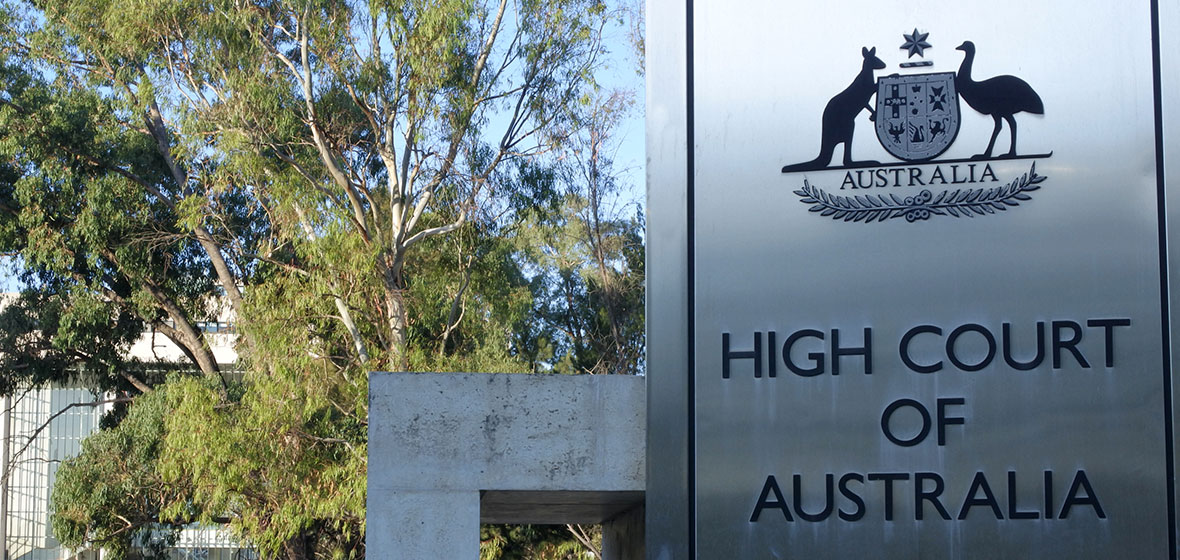Snapshot
- In the recent decision of Burns v Corbett [2018] HCA 15, the High Court has found that NCAT (and similar tribunals) is not permitted to hear ‘Federal Matters’ including disputes between residents of different States of Australia.
- The case raises important issues about the powers and limits of Parliament (Federal and State) to confer jurisdiction on courts and other bodies concerning ‘Federal Matters’.
- While offering an intriguing (and contrasting) judicial anthology on federalism for constitutional law enthusiasts, the decision carries very real and practical import for practitioners, particularly in property matters where one or more parties is resident outside NSW.
The basic point of this decision is that the NSW Civil and Administrative Tribunal (‘NCAT’) (and similar tribunals) is not permitted to hear ‘Federal Matters’ including disputes between residents of different States of Australia.
The much-awaited decision is unanimous in its orders. But the ‘knotty constitutional problem’ is not entirely unfurled; the judgments are a smorgasbord of diverging constitutional reasoning. The case raises important issues about the powers and limits of Parliament (Federal and State) to confer jurisdiction on courts and other bodies concerning ‘Federal Matters’. While offering an intriguing (and contrasting) judicial anthology on federalism for constitutional law enthusiasts, it carries very real and practical import for practitioners, particularly in property matters where one or more parties is resident outside NSW.
Factual background
The circumstances leading to the ultimate legal journey in Canberra had remarkable origins. It spanned three State borders (this being its gateway to the High Court). In 2013, Ms Corbett, a political aspirant (resident in Victoria) controversially stated she wanted no ‘gays, lesbians or paedophiles working in my kindergarten’. This was published by the Hamilton Spectator. Mr Gaynor, a Senate candidate (resident in Queensland) publicly supported the statements. Mr Burns (resident in New South Wales), an anti-discrimination activist, said the statements vilified homosexuals contrary to the Anti-Discrimination Act 1977 (NSW). He complained to the Anti-Discrimination Board of New South Wales. Proceedings ensued in the (then recently formed) NCAT.
New South Wales Court of Appeal
Following various steps in NCAT, a threshold jurisdictional issue was considered by the New South Wales Court of Appeal. The Court (Leeming JA with whom Bathurst CJ and Beazley P agreed) held that NCAT did not have standing to determine Mr Burns’ complaints against Ms Corbett or Mr Gaynor; the parties were residents of different States of Australia. This stirred flurries across Australia; Mr Burns, the State of NSW and the Attorney General for NSW each appealed by special leave to the High Court. The Attorneys General of Queensland, Western Australia, Tasmania and Victoria intervened in support of NSW.
Material provisions
Commonwealth of Australia Constitution Act 1900
- Chapter III: establishes the Federal Judicature (ss 71–80)
- Section 71: the judicial power of the Commonwealth is vested in the High Court and other courts created by Commonwealth Parliament (cf State parliaments)
- Section 75(iv): the High Court has ‘original jurisdiction’ for matters between residents of different States (‘Diversity Matters’)
- Section 77(iii): Commonwealth Parliament may legislate regarding (inter alia) section 75(iv) matters to invest a State court with Federal jurisdiction
- Section 109: if a State law is inconsistent with a Commonwealth law, the latter prevails and the former is invalid
- Section 39: excludes State jurisdiction where the High Court has ‘original jurisdiction’ and invests State courts with conferred jurisdiction, the effect of which is that State courts can adjudicate Federal Matters (ss 75 and 76 of the Constitution) including Diversity Matters, but it is an exercise of Federal jurisdiction, not State jurisdiction.
Common ground
The following assumptions were accepted without argument:
- The parties were residents of different States (within s 75(iv) of the Constitution);
- Matters in sections 75 and 76 of the Constitution are ‘Federal matters’ (including Diversity Matters) (‘Federal Matters’); and
- NCAT is not a ‘State court’ for the purposes of Chapter III of the Constitution.
The High Court
All appeals were dismissed.
Commonwealth’s submissions
The Commonwealth contended that NCAT lacked jurisdiction to determine the complaints on two bases. First, there is an implied constitutional constraint against State legislative power; a State law (such as the Civil and Administrative Tribunal Act 2013 (NSW)) is invalid if it confers judicial power over Federal Matters on a body (such as NCAT) which is not a court of the State (‘Implication Submission’). Second, such a State law is inconsistent with section 39 of the Judiciary Act and invalid by operation of section 109 of the Constitution (‘Inconsistency Submission’).
Summary of decision
The majority (Kiefel CJ, Bell and Keane JJ) accepted the Implication Submission. They did not determine the Inconsistency Submission. Gageler J agreed with the majority. Conversely, Gordon J (with whom Nettle J agreed, although also providing a separate judgment) rejected the Implication Submission but accepted the Inconsistency Submission, as did Edelman J. The minority judgments reached the same conclusion as the NSWCA.
Kiefel CJ, Bell and Keane JJ
Their Honours accepted the Implication Submission. That is, the Constitution impliedly prevents State laws conferring adjudicative authority over Federal Matters (including Diversity Matters) on a body (such as NCAT) that is not a State court. This conclusion was ‘compelled’ by the constitutional text, structure and its purpose. They emphasised that Federal Matters were exhaustive, and Chapter III of the Constitution provided for the authoritative adjudication of these matters by Federal courts (and State courts coopted for that purpose) but not State administrative bodies, such as NCAT. Their Honours turned to The Boilermakers’ Case (1956) 94 CLR 254 at 267-268:
‘A federal constitution must be rigid. The government it establishes must be one of defined powers; within those powers it must be paramount, but it must be incompetent to go beyond them … The demarcation of the powers of the judicature, the constitution of the courts of which it consists and the maintenance of its distinct functions become therefore a consideration of equal importance to the States and the Commonwealth. While the constitutional sphere of the judicature of the States must be secured from encroachment, it cannot be left to the judicial power of the States to determine either the ambit of federal power or the extent of the residuary power of the States. The powers of the federal judicature must therefore be at once paramount and limited.’
Their Honours held that the ‘demarcation’ of powers of the judicature in Chapter III demanded that only Courts may adjudicate Federal Matters, not tribunals. Integral to their reasoning was the need to have consistent and coherent adjudication throughout Australia. And although a Commonwealth Parliament can select courts in which Federal jurisdiction may be conferred, this does not permit a State Parliament to pre-empt Commonwealth Parliament.
In considering the historical context and purpose of the Constitution, their Honours (emphatically) concluded (at [56]): ‘[there is not the] faintest suggestion in any historical materials that our founders entertained, even for a moment, the possibility that disputes … of residents of different States might be … adjudicated by institutions of government of the States other than their courts’.
Gageler J
His Honour agreed with the conclusion of the joint judgment. Separately, he considered the meaning of specific Constitutional terminology (including ‘matters’, ‘jurisdiction’ and ‘court’). He also considered colonial courts and stressed, ‘On federation, everything adjusted’ (at [72]) and ‘I reiterate, on federation, everything adjusted’ (at [112]).
While accepting that history is apposite to constitutional interpretation, he warned, ‘concentration on historical minutiae can distract from the discernment and exposition of constitutional principle’ (at [107]) and chunks of pre-federation history cannot be ‘bootstrapped’ to aid Constitutional interpretation (at [111]). The interpretation of the Constitution has ‘taken time’ as has the unfolding of its implications (at [113]) because it was not ‘framed for the moment of its creation, but as an enduring instrument of government’ (at [116]).
In conclusion, Gageler J noted the inevitability of the soundness of the Implication Submission (at [118]), ironic, given the opposite conclusions in the minority judgments. ‘To no-one who has studied the … Court’s exegesis of Ch III over the past half-century, who has [read] … the considered reasoning of intermediate appellate courts [in] the past decade, or who is abreast of leading contemporary academic commentary, could … [it] come as a surprise … [that the High Court would confirm that the Constitution impliedly denies] … State legislative power [conferring] State judicial power [for s 75 or s 76 matters].’
Gordon J
Her Honour rejected the Implication Submission but accepted the Inconsistency Submission. She was unpersuaded that the Federal Matters were topics of ‘special’ Federal concern for which the Constitution required a ‘closed scheme’ exclusively reserved for courts but not tribunals (at [177]). Rather, Federal Matters were ‘facultative’ and Federal control over the jurisdiction of those matters was not ‘pre-ordained’ by the Constitution (at [179]). To the extent that there was control over their adjudication, it depended on whether there was legislation enacted (as permitted by section 77 of the Constitution). Here, there was legislation so enacted; the Judicary Act 1903 (Cth) by which Commonwealth Parliament exercised jurisdiction over Federal Matters. Her Honour said (at [184]) that ‘[u]ntil [the legislative power in section 77(ii)] was exercised [i.e., in 1903] there was nothing inherently problematic about State tribunals exercising jurisdiction in matters between residents of different States. Once the power … was exercised … it … became incoherent, or at least problematic, for the States to continue to be free to confer such jurisdiction on tribunals. But any such incoherence did not exist until the enactment of the Judiciary Act.’
The much-awaited decision is unanimous in its orders. But the ‘knotty constitutional problem’ is not entirely unfurled; the judgments are a smorgasbord of diverging constitutional reasoning. The case raises important issues about the powers and limits of Parliament (Federal and State) to confer jurisdiction on courts and other bodies concerning ‘Federal Matters’.
Her Honour referred to Felton v Mulligan [1971] HCA 39 in support of the proposition that the source of a State court’s authority to adjudicate on matters between residents of different States is Federal. Following from this, a State law (such as the NCAT Act) conferring authority to determine a Federal Matter on a body other than a State court is inconsistent with section 39 of the Judiciary Act; a State court’s jurisdiction for Federal Matters must derive from a Federal source. By operation of section 109 of the Constitution, the inconsistent State law is invalid (at [150]). She rejected the Implication Submission as ‘logically flawed’ and ‘hinged on a concern that federal control might be circumvented’ (at [184]).
Gordon J held that pre-1903 (i.e. before the enactment of the Judiciary Act) the jurisdiction of a body such as NCAT (if it had existed then) to hear Federal Matters was not barred by the Constitution nor any implication therein (at [183]). She raised doubts over the historical arguments supporting the Implication Submission; she maintained there was no historical basis for contending that the Constitution created a ‘closed scheme’ in which only courts could exercise jurisdiction in Federal Matters. Plainly, bodies other than courts exercised judicial power prior to Federation (and prior to 1903) without objection (at [185]).
Nettle J
His Honour provided separate reasons but agreed with the conclusions of Gordon J and proceeded upon very similar reasoning. He also acknowledged the ‘considerable assistance from the lucid reasons in the Court of Appeal of the Supreme Court of New South Wales’ (at [209]).
Edelman J
His Honour delivered a separate judgment but his reasoning was closely aligned with Gordon J. He rejected the Implication Submission (at [205]) noting that it lacked a principled basis
(at [210]), was devoid of authority and the Boilermakers’ Case did not compel an implication being drawn ‘117 years after Federation’ (at [207]). He referred to legal history (including United States constitutional history) and examined the operation of tribunals at the time of Federation (e.g. local Land Boards and Boards of Railway Commissioners). He concluded that the historical context at Federation was inconsistent with the Implication Submission (at [210]).
Implications
Implications abound. Volumes of NCAT’s work comprise residential tenancies and retail leases. Now, these cannot be aired in NCAT if one or more of the parties is resident of
another State. The newly amended NCAT Act (Part 3A) partly deals with the jurisdiction gap; enabling a referral to a court if NCAT lacks jurisdiction, but it remains to be seen how costs will be governed in referrals (a very different costs regime applies in NCAT as opposed to courts). Uncertainty persists for cases determined prior to the amendments. In other States, for example, Victoria, uncertainty remains. Under the Retail Leases Act 2003 (Vic) only VCAT, and not courts, has jurisdiction to hear retail leasing matters (with only limited exceptions). This is likely to require imminent legislative amendment.





